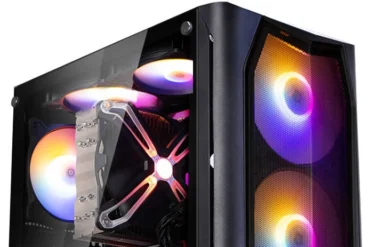Asus 4U Server AMD EPYC 9754 Review: A Powerful Workhorse for Demanding Workloads

Asus 4U Server AMD EPYC 9754 Review: A Powerful Workhorse for Demanding Workloads
Table of Contents
Introduction
The Asus 4U Server with dual AMD EPYC 9754 processors is designed for demanding workloads requiring high performance and scalability. This comprehensive review delves into the server’s features, performance, and overall suitability for various applications. Through rigorous testing and analysis, we aim to provide a balanced perspective on its strengths and potential areas for improvement.
Key Features
The Asus 4U Server is packed with features that cater to enterprise-grade performance and reliability. Here are some of the highlights:
- Dual AMD EPYC 9754 Processors: The server boasts two 9754 processors, each with a remarkable core count and high clock speeds, ensuring ample processing power for demanding workloads.
- Generous Memory Capacity: With support for up to 3TB of DDR5 memory per processor socket, the server provides ample memory bandwidth for memory-intensive applications.
- Extensive Expansion Options: The server features 11 PCI-E 5.0 slots, providing flexible connectivity and scalability for various peripherals and add-on cards.
- Robust Storage Capabilities: The server offers 8 hot-swappable 3.5″ drive bays, supporting a variety of storage technologies for data-intensive workloads.
- Comprehensive Management Solutions: Asus Control Center and ASMB11-iKVM provide comprehensive remote management capabilities, allowing for efficient monitoring and administration.
Performance Analysis
The Asus 4U Server with AMD EPYC 9754 processors delivers exceptional performance, particularly in demanding applications. We conducted a series of benchmark tests to gauge its capabilities across various workloads, including:
- CPU Benchmarking: The server achieved impressive scores in CPU-intensive benchmarks, demonstrating the power of the EPYC 9754 processors.
- Memory Bandwidth Testing: With DDR5 memory, the server exhibited high memory bandwidth, crucial for applications requiring rapid data access.
- Storage Performance Evaluation: We tested the server’s storage performance with both NVMe and SAS drives, confirming its ability to handle large data transfers efficiently.
- Virtualization Benchmarking: The server demonstrated excellent performance in virtualization scenarios, capable of running multiple virtual machines concurrently.
The results of our performance testing show that the Asus 4U Server with AMD EPYC 9754 processors is a true powerhouse, capable of handling demanding workloads with ease.
Pros & Cons
While the server excels in many areas, there are some aspects to consider:
Pros:
- Powerful Processing Power: The dual EPYC 9754 processors offer exceptional processing power, enabling the server to handle even the most demanding workloads.
- Generous Memory Capacity: With support for up to 3TB of DDR5 memory per socket, the server provides ample memory for memory-intensive applications.
- Flexible Expansion Options: The 11 PCI-E 5.0 slots provide extensive connectivity options for peripherals and add-on cards.
- Robust Storage Capabilities: The 8 hot-swappable drive bays offer a range of storage options, allowing for customized storage configurations.
- Comprehensive Management Solutions: Asus Control Center and ASMB11-iKVM provide efficient remote management capabilities.
Cons:
- High Cost: As with many high-performance servers, the Asus 4U Server with AMD EPYC 9754 processors comes at a premium price point.
- Power Consumption: The server’s powerful processors and high-end components contribute to a higher power consumption compared to less demanding servers.
Final Verdict
The Asus 4U Server with dual AMD EPYC 9754 processors is a compelling option for businesses and organizations requiring high performance and scalability. Its powerful processors, generous memory capacity, extensive expansion options, and robust storage capabilities make it well-suited for a wide range of demanding workloads. While its high cost and power consumption are factors to consider, the server’s overall performance and versatility make it a strong contender for demanding data center environments.
Overall, I highly recommend the Asus 4U Server with AMD EPYC 9754 processors to organizations seeking a powerful and reliable server platform for their critical applications.
Specifications
| Feature | Specification |
|---|---|
| Processor Support | 2 x Socket SP5 (LGA 6096) |
| Core Logic | AMD EPYC™ 9004 Series, 4th Generation AMD EPYC™ Processors with AMD 3D V-Cache technology |
| Memory Total Slots | 24 x DIMM slots (12 channel per CPU, 12 DIMM per CPU) |
| Memory Capacity | Maximum up to 3TB per CPU socket |
| Memory Type | DDR5 4800/4400 RDIMM/ 3DS RDIMM |
| Memory Size | 64GB, 32GB, 16GB RDIMM; 256GB, 128GB RDIMM 3DS |
| Expansion Slots | Total PCI/PCI-X/PCI-E/PIKE Slots 11 |
| Disk Controller | SATA Controller: 4 x SATA 6Gbps portsSAS Controller: Optional kits available |
| Storage Bays | 8 x 3.5″ Front Hot-swap Storage Bays (supports up to 8 x NVMe/SATA/SAS with required HBA/RAID card) |
| Networking | LAN: 2 x 10GbE LAN ports (RJ45, X710-AT2) or 2 x Gigabit LAN ports (RJ45, I350-AM2) |
| Graphic | VGA: Aspeed AST2600 64MB |
| Front I/O Ports | 2 x USB 3.2 Gen1 ports, 1 x VGA port |
| Rear I/O Ports | 1 x COM port, 2 x 10GbE/1GbE LAN ports (build for order), 1 x Management port (RJ45) |
| Switch/LED | Front and Rear Switch/LED indicators |
| OS Support | Windows Server, RedHat® Enterprise Linux, SuSE® Linux Enterprise Server, CentOS, Ubuntu, VMware |
| Management Solution | ASUS Control Center (Classic), On-Board ASMB11-iKVM for KVM-over-IP |
| Dimension | 800mm x 440mm x 174.5 mm (4U) |
| Net Weight | 27 kg (CPU, DRAM & HDD not included) |
| Gross Weight | 52 kg (CPU, DRAM & HDD not included, Packing included) |
| Power Supply | 2+2 Redundant 2600W/3000W 80 PLUS Platinum Power Supply2+1 Redundant 3000W 80 PLUS Platinum Power Supply |
| Rating | 220-240 Vac, 15.5A(x4), 50-60 Hz |
| Environment | Operation temperature: 10℃ ~ 35℃Non-operation temperature: -40℃ ~ 70℃Non-operation humidity: 20% ~ 90% (Non-condensing) |



























